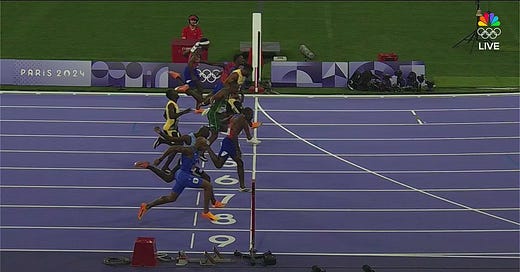Why I Don’t Like the Olympics
Did you know that the 100-meter dash ends when a player’s TORSO “as distinguished from the head, neck, arms, legs, hands or feet” crosses the vertical plane of the finish line? I did not, but this information proved crucial in determining the outcome of Saturday’s Olympic men’s race, who turned out to be Noah Lyles after a photo finish.
Of course, this seems like a pretty arbitrary standard upon which to base the moniker of “fastest man in the world,” which will now be affixed to Lyles for the next four years. Obviously you need SOME standard, but it’s notable that using a “head” standard, or a “limb” standard — both of which seem just as valid to me as a torso standard — would result in a different winner, and therefore a different gold medalist, and therefore a different “fastest man in the world.”
And this, I think, gets at part of why I dislike the Olympics. In addition to the aggressive nationalism, which James and I complained about in our last podcast episode, there is also this fact that the Olympics seem to encourage a type of sports fandom I have little interest in: a hyperfixation on one-off demonstrations of skill, all in pursuit of determining a hierarchy of individuals based on a standard that is, fundamentally, pretty arbitrary.
As I wrote way back in my very first edition of this newsletter, the thing I like about sports is that you are watching people AT WORK. That is, they capture something about the day-to-day pursuit of excellence and victory — a pursuit that is often not simple or linear. LeBron James might be the greatest basketball player I’ve ever seen, but there are games I’ve watched where he played like complete trash. Serena Williams is the GOAT, but there were matches when she just didn’t have it. Tom Brady was the best quarterback ever, but there were times early in his career when I wondered if he was any good at all. It is precisely because of these moments that their conquests are so impressive.
More to the point, this is what makes their accomplishments relatable and meaningful. After all, this is how most great things are achieved: after a lot of setbacks and disappointment.
Olympians obviously experience setbacks and disappointment too — but most fans never see those moments. We are only seeing the final product. And the whole point of that final product is to create some sacrosanct ranking of the “best” or “strongest” or “fastest” — a ranking that, as the Lyles victory shows, doesn’t even hold up to scrutiny. If you were really interest in who was the “fastest man in the world,” then you wouldn’t base the whole thing on one race every four years. What if the fastest man is sick that day? If you were serious, you’d obviously have to pay continuous attention over a long period of time.
But we don’t have time for that, so we demand answers NOW, even if it’s only through a 0.005 second difference based on a standard none of us were even aware of…
Frankly, this feels like Boss Behavior to me. That is, it carries such a contempt for the mundane work of improvement, such a fetish for ranking people based on skills that are obviously fluid and context-dependent, such an impatience for answers — even arbitrary answers, so long as they come quickly and definitively — that the whole Olympics strike me as profoundly capitalistic to me.
I mean, who even cares who the “fastest man in the world” is? Pick up a ball and learn a trade…



